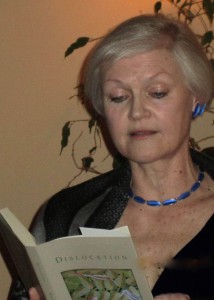Book Review: Dislocation by Margaret Meyers
 4/7/14 – BOOK REVIEW: DISLOCATION BY MARGARET MEYERS
4/7/14 – BOOK REVIEW: DISLOCATION BY MARGARET MEYERS
With more than a million books published each year in the United States alone, it’s all too easy to overlook a wonderful author. Don’t do that to Margaret Meyers, whose new story collection, Dislocation, has just been published by Entasis Press.
Meyers’s multilayered stories are charming, insightful, and significant, with writing that’s filled with wit and humor. There’s no better way to capture the power of her prose than to quote it. Consider the opening of Doing Good:
“As the young black woman climbs into the front passenger seat of the VW Bug, Delia, crosslegged in the back, notes that her mother’s ears are still ripe-tomato red. Her mother speaks to the young woman in her calm, warm, Sunday-morning voice but those ears, generally very pale with tiny gold freckles, tell Delia that her mother is very far from calm.”
The story unfolds from Delia’s perch in the back seat. Her twelve-year-old eyes are focused on what’s happening in front of her, but her own, very personal concerns keep intruding, especially after noticing the “nice bosom” of her mother’s passenger.
“Delia touches her right nipple, which is about the size of a match head — only without, it seems to her, the potential for transformation inherent in a match head. She doesn’t know why she thinks of such an explosive comparison — fire, danger, heat — but she does.”
Delia’s mother is the wife of a missionary and she has offered the ride to show support for a bus boycott in Johannesburg similar to the one that forced authorities to back down in 1957. The offer of a ride soon turns into something more complicated, and through Delia’s eyes and Meyers’s deft hand, we experience the chasm between meaning well and “doing good.”
That proves to be one of several recurring themes in Dislocation, a volume of stories largely about people who’ve been lifted out of their natural surroundings and plopped down in unfamiliar places and circumstances. Some have moved by choice, but most have been dislocated by circumstances or the decision of a parent or spouse. However it happened, Meyers’s characters find themselves struggling to understand and cope, usually with mixed results.
Meyers’s first collection, the critically acclaimed Swimming in the Congo, was a series of interlocking stories narrated by the seven-year-old daughter of missionaries in the Congo. That book was rooted in Meyers’s own childhood and described the challenges and frustrations of missionary work with charming insight. She has also published stories in several literary journals and teaches writing at Johns Hopkins University. (Disclosure: I was lucky enough to be a student of hers several years ago.)
The twelve gems in Dislocation examine some of the same themes as the first book, with even greater effect. Religion plays a central role, with fundamental questions raised in original and disconcerting ways. Many of the central characters are missionaries, ministers, or children and spouses of clergymen, and the predicaments they find themselves in give Meyers considerable opportunity to dig deeply into the relationship between a belief in God and how that influences—or doesn’t influence—the way we live our lives. Meyers is relatively gentle in her treatment of her characters, who often come off as sincere if misguided or even foolish, but she is unstinting in questioning their beliefs and their application to the real world.
Africa serves as the setting for five of the stories, while the others hop around the globe, from Renaissance Florence to the American Midwest to a World War II battlefield. One is set at a divinity school in a New Jersey town that bears a close resemblance to Princeton. Another takes readers to Chicago where a minister and his wife argue over his plans to perform an exorcism neither of them believes in.  One of the most enchanting tales is set in 16th century England and is told in the voice of Ann More, the wife of poet John Donne, a woman who bore him twelve children in sixteen years. Another delight, Eau de Paradis, takes place in the perfume department at Saks.
One of the most enchanting tales is set in 16th century England and is told in the voice of Ann More, the wife of poet John Donne, a woman who bore him twelve children in sixteen years. Another delight, Eau de Paradis, takes place in the perfume department at Saks.
The prose is original and elegant, with characters who stay with you. Whether the protagonist is a soldier lost and alone on a World War II battlefield, a woman coming to grips with a complicated marriage, a child trying to find her place in the world, or an adult hoping to reconcile an exotic past with the person she’s become, the voice and pitch are perfect, with plenty of wit and wisdom.
There’s also plenty of humor. Here’s an excerpt from Sousaphone, a story in which a preteen at a school for missionary children in the Congo seeks permission to become the marching band’s first female sousaphone player:
“Birgit asks how it went.
I tell her that Reverend Palmquist is quite sure that the Lord does not approve of girls playing the sousaphone, but he’ll ask Him just to be sure. He’ll get back to me as soon as the Lord gets back to him. Because the Lord moves in mysterious ways, it could end up taking a while.
What a lot of getting back to people over playing the sousaphone, she says. But then I don’t suppose those American churches that donated the instruments to us ever thought a girl would want to play a sousaphone. I’d give up if I were you.
But I really want to play, I say. And soon. The Rapture could happen any day now.”
If one tale impresses more than others, it’s The Deluge, which tells the story of two young orphans who find themselves perched precariously atop a leg of the Trinita Bridge after a flood destroys a wide swath of Florence. As night falls, the youngsters are left waiting for the waters to recede so they can be rescued:
“Across the darkly churning Arno, Piero could see the faint here-and-there glow of candles and lanterns. Families were eating their evening meal just as they had before the Deluge. He could almost hear the laughter, the squabbles, the admonitions to eat, to sit still, to not kick one’s sister. How he and his grandmother used to roll their eyes and grimace at the noisy meals that went on in the household upstairs: the father shouting one order after another, the mother scolding, the son complaining, the daughters giggling, the baby babbling. How carefully he and his grandmother had supported one another in the belief that they were fortunate in their mealtime calm and order….Piero never ever considered saying what he really did wish for every single day of his life: his mother, his father, and the palpable third presence that was the love they had created between them.”
The mood and tone of The Deluge reminded me of The Earthquake in Chile, Heinrich von Kleist’s classic 1807 tale, which also focuses on a natural disaster that leaves survivors struggling to explain and understand God’s wrath. In von Kleist’s tale, a couple who bore a child out of wedlock become scapegoats. Meyers handles it this way:
“It occurred to Piero that his grandmother’s piety had been in vain. Judgment had been visited upon her even though she did not commit those sins she most despised, the sins of greed, of disbelief, of wantonness and lechery. Perhaps it was impossible to obey God enough; perhaps God simply enjoyed judging more than forgiving.”
Though certain themes run through the stories, there’s never a sense that you’re visiting ground already tread. The characters and situations are so unusual and varied that each feels like an entirely new experience.
Like any good collection, the stories in Dislocation stand on their own, each having the depth, breadth, and story arc of a full literary experience. But at the same time they build on one another, growing more powerful as you progress through the volume, leaving an impression that stays with you long after you turn the last page.
Dislocation by Margaret Meyers, Entasis Press, Washington, DC, 2014, 234 pp.
Mark Willen
Mark Willen’s novels, Hawke’s Point, Hawke’s Return, and Hawke’s Discovery, were released by Pen-L Publishing. His short stories have appeared in Corner Club Press, The Rusty Nail. and The Boiler Review. Mark is currently working on his second novel, a thriller set in a fictional town in central Maryland. Mark also writes a blog on practical, everyday ethics, Talking Ethics.com.
- Web |
- More Posts(48)
